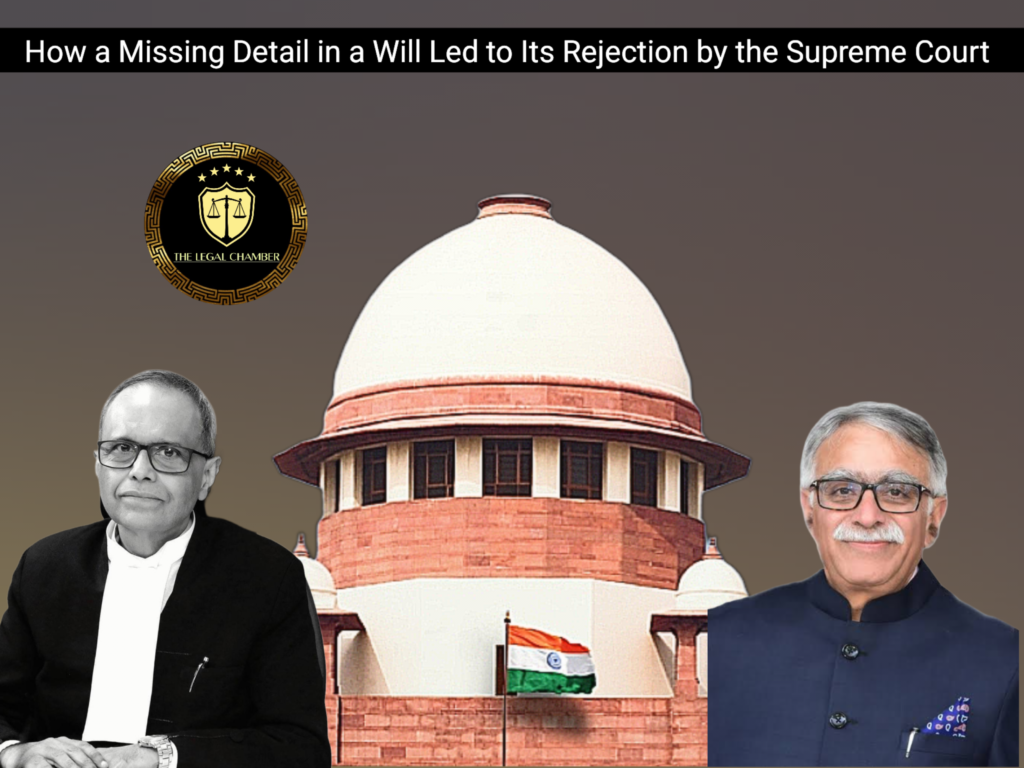
The Supreme Court ruled that a Will omitting the testator’s wife without justification raises suspicious circumstances, vitiating its validity under Section 63 of the Indian Succession Act, 1925, and Section 68 of the Evidence Act, 1872. The Court emphasized that propounders must explain unnatural exclusions to prove the testator’s free will, failing which the Will becomes invalid. Suspicion arises from non-mention of a natural heir (wife) and lack of reasons for disinheritance, shifting the burden to the propounder to dispel doubts. Registration and signatures alone cannot override such irregularities if the disposition appears coerced or influenced. The judgment reaffirms judicial scrutiny of Wills to ensure genuine voluntary execution.
Facts Of The Case:
Maya Singh owned agricultural land in village Sathiala. Upon his death in 1991, his nephew, Gurdial Singh (the appellant), claimed ownership through a Will dated May 16, 1991, which bequeathed the property to him. Maya Singh’s wife, Jagir Kaur (the first respondent), and a man claiming to be their adopted son, Gurpal Singh (the second respondent), contested the Will, asserting their rightful inheritance. The Trial Court initially upheld the Will, dismissing Jagir Kaur’s suit and accepting Gurdial Singh’s claim, though it recognized her as Maya Singh’s lawful wife. The First Appellate Court affirmed this decision. However, the Punjab & Haryana High Court reversed the ruling, declaring the Will invalid due to suspicious circumstances—notably, the omission of Jagir Kaur’s status as the wife and the absence of reasons for her exclusion. The High Court held that this raised doubts about the testator’s free will. In appeal, the Supreme Court examined whether such omissions vitiated the Will. Evidence showed Jagir Kaur lived with Maya Singh until his death, had no strained relationship, and received his pension, making her exclusion unexplained. The Court concluded that the Will’s silence on her role and the appellant’s attempt to deny her marital status indicated undue influence, rendering the Will invalid. Jagir Kaur was declared the rightful owner.
Procedural History:
The case originated when Gurdial Singh (appellant) filed a suit in 1992, relying on a Will allegedly executed by Maya Singh in his favor. Jagir Kaur (first respondent) contested the Will and filed a separate suit asserting her rights as Maya Singh’s widow. The Trial Court dismissed Jagir Kaur’s suit and upheld the Will, a decision affirmed by the First Appellate Court. Aggrieved, Jagir Kaur filed second appeals (RSA Nos. 837 and 958 of 1996) before the Punjab & Haryana High Court, which reversed the lower courts’ judgments, declaring the Will invalid due to suspicious circumstances. Gurdial Singh then appealed to the Supreme Court, which, after examining the evidence and legal principles, upheld the High Court’s decision, ultimately ruling in favor of Jagir Kaur and dismissing the appeals. The Supreme Court’s judgment reinforced the necessity of proving a testator’s free will and the duty to explain unnatural exclusions in a Will.
READ ALSO:Supreme Court Clarifies: Limitation Act Applies to MSMED Arbitration But Not Conciliation
Court Observation:
The Supreme Court emphasized that while a Will must comply with formal requirements under the Indian Succession Act, 1925, its validity hinges on the testator’s free and sound disposition of mind. The Court noted that the omission of Jagir Kaur—Maya Singh’s lawfully wedded wife—from the Will, without any explanation for her exclusion, constituted a glaring suspicious circumstance. It observed that such an unnatural disposition, coupled with the appellant’s attempt to deny Jagir Kaur’s marital status, indicated undue influence rather than the testator’s independent intent. The Court underscored that mere registration and proof of signatures do not absolve the propounder of the duty to dispel suspicions, especially when natural heirs are disinherited without justification. It rejected the Trial Court’s reasoning that non-performance of last rites by the wife implied estrangement, clarifying that Hindu/Sikh customs typically assign such rites to male relatives. Ultimately, the Court held that the Will failed to reflect Maya Singh’s genuine intent, rendering it invalid. The judgment reinforced the judiciary’s role in scrutinizing Wills to prevent fraud and coercion, ensuring testamentary freedom is exercised voluntarily.
Final Decision & Judgement:
The Supreme Court dismissed the appeals and upheld the Punjab & Haryana High Court’s judgment, declaring the Will dated 16.05.1991 invalid due to suspicious circumstances surrounding its execution. The Court ruled that the complete omission of Jagir Kaur (Maya Singh’s legally wedded wife) from the Will, without any explanation for her exclusion, fundamentally undermined the document’s validity as it failed to demonstrate the testator’s free will. The bench emphasized that while testamentary freedom allows disinheriting legal heirs, such exclusion must be justified and not appear coerced or unnatural. Finding that the appellant failed to rebut the presumption of undue influence created by these irregularities, the Court affirmed Jagir Kaur’s ownership rights over the suit property. The judgment reinforced stringent judicial scrutiny of Wills where natural heirs are excluded without rational basis, protecting against fraudulent or manipulated testamentary dispositions. All pending applications were disposed of accordingly.
Case Details:
Case Title: Gurdial Singh (Dead) Through LR vs. Jagir Kaur (Dead) & Anr. Citation: 2025 INSC 866 Appeal No.: Civil Appeal Nos. 3509-3510 of 2010 Date of Judgment: July 17, 2025 Bench:Justice Sanjay Karol & Justice Joymalya Bagchi
Download The Judgement Here